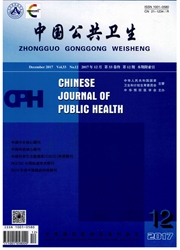

 中文摘要:
中文摘要:
目的通过对社区老年人认知功能的横断面调查,探讨老年人认知功能随年龄增加改变的规律。方法以山西省太原市5个社区的1065名60岁以上非痴呆老年人作为研究对象,进行认知功能测查及一般情况调查。结果算术、数字广度、填图、木块图几项测验得分在年龄组间差异均有统计学意义(F值分别为8.31,4.97,3.52,4.50;P均〈0.05)。在不同受教育程度者间差异也有统计学意义(F值分别为29.19,36.94,19.39,18.25,P均〈0.05)。性别对除数字广度测验(F=1.774,P〉0.05)以外的其他3项测验得分影响差异有统计学意义(F值依次为36.58,15.39,5.54;P均〈0.05)。受教育程度与年龄有交互作用。结论年龄是认知功能下降的危险因素,特别是75岁以后各项认知功能都处在低于65岁之前的水平。受教育水平对认知功能下降的保护作用有限,75岁以后受教育水平高者认知功能的优势减弱。
 英文摘要:
英文摘要:
Objective To explore age related decline of cognitive ability in aged people in community. Methods A total of 1 065 non - dementia aged people were recruited from five districts of Taiyuan, China. The cognitive ability and the demographic characteristics of the subjects were investigated. Results Age and education were associated with the score of all of the four subtests. Gender was associated with all of the subtests except for digit span. Interaction to the score of cognitive tests was found between age and education, Conclusion Age is a risk factor for cognitive decline which showed its effect particularly after the age of 75, The priority of education decreased after the age of 75, indicating that the protective effect of education to cognition is age- limited.
 同期刊论文项目
同期刊论文项目
 同项目期刊论文
同项目期刊论文
 期刊信息
期刊信息
